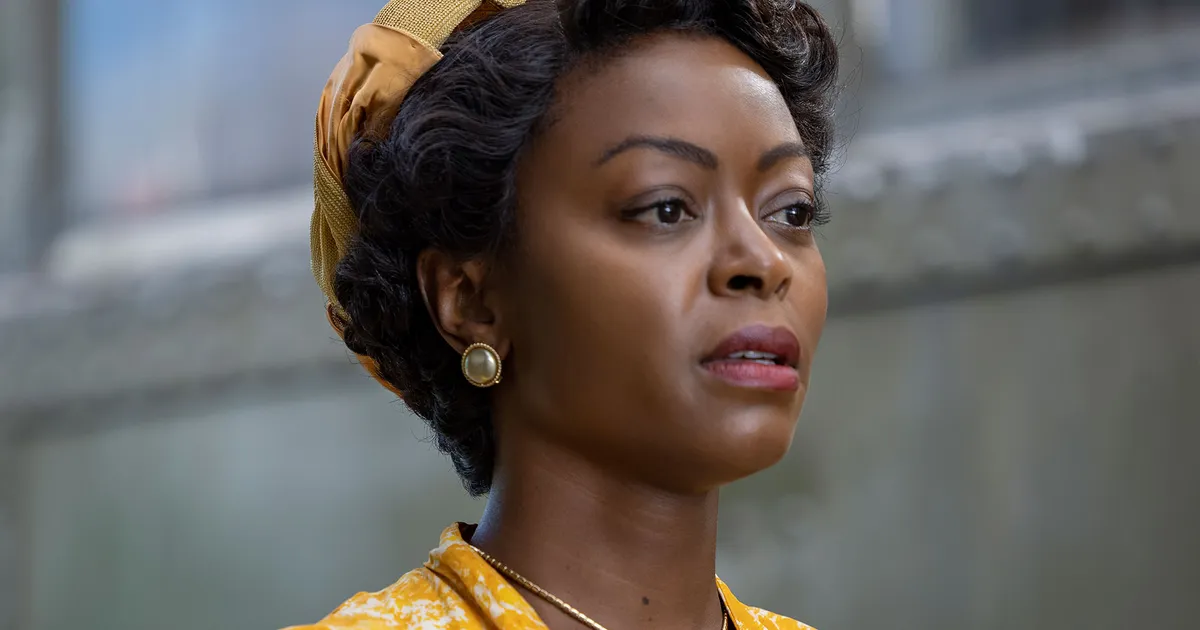
Till tells the true story of the famed, brutal lynching of Emmett Till (Jalyn Hall) in 1955 Mississippi following his encounter with Carolyn Bryant (Haley Bennett) at her family’s grocery store and his mother Mamie Till-Mobley’s (Danielle Deadwyler) pursuit of justice while still grieving for the loss of her son.
If you’re familiar at all with the Emmett Till story, there’s not much new ground broken in this film, which isn’t a criticism at all. We’re shown a boisterous, naive young man going away from home alone for vacation for the first time, complete with a nervous mother who can’t bear to see him go. We witness his fateful encounter with Carolyn Bryant at the Bryant Grocery Store, his kidnapping (but not the murder itself), and the spark of the Civil Rights Movement that followed. What prevents Till from becoming just a narrative retelling of what occurred that fateful summer of 1955 is the intimate way that its story follows Emmett’s mother Mamie as she deals with the horrific murder of her son and the quest for justice amidst a media firestorm and the racist environment of Jim Crow Mississippi.
This up close and personal documentation of Mamie’s journey is best summed up by the intimate way that the audience is escorted alongside Mamie as she goes about the process of identifying Emmett’s mangled and brutalized body. Just as Mamie did nearly 70 years ago, director Chinonye Chukwu decides in the film to show the condition of his body after his brutal murder and days submerged in the Tallahatchie River to the camera. The decision is sure to be a hotly debated one, with some viewers sure to consider it exploitative and others finding a parallel between this creative decision and the decision his mother made to force the world to see the end result of racial hatred and brutality. The camera slowly and deliberately follows Mamie’s touch and gaze as she scans her son’s body and touches his skin in order to properly identify him. It is of course not a pleasant sight, but it garners empathy for his mother, highlights her courage and strength, and makes plain the grim reality of what Emmett suffered and why his killing became a symbol for the state-sponsored terrorism that blacks in the American south had endured for a century and for which his death would be a catalyst for rebellion against. Choosing how to handle this moment and whether or not to go there when it came to the infamous choice to put the condition of his body in full view, adds a bit of weight to the film and reinforces its positive qualities.
Till also takes the time to fully examine and flesh out the human relationships after the tragedy that touch upon the lingering questions that arise out of grief, who to blame and how to handle the anger stage. The yin and the yang of this question revolve around Mamie’s experiences with two people, Emmett’s uncle Moses Wright (played convincingly by John Douglas Thompson) and Carolyn Bryant, his fateful accuser. Wright must reconcile with Mamie, and by extension the audience, why he did not put up a greater fight against Roy Bryant, J.W. Milam, and the other men who came to accost Emmett. Thompson’s powerful portrayal of a black man living in the Jim Crow south who had to make a split second decision on the real life Trolley Problem, weighing the reality of his powerlessness in defending his family against white men with his desire to protect, encapsulates the terrorism of the era and how it handicapped the blacks who lived under it. If it were not clear to anyone, as it wasn’t to the largely apolitical, Northern raised Mamie, Moses makes plain what he would’ve risked fighting back within a system that would turn a blind eye to the massacre of an entire black family, which would eventually motivate the desire to collapse the entire system itself.
Till also makes an effort to consistently juxtapose shots of Mamie vis-à-vis Carolyn Bryant, as Emmett’s accuser appears in court, mostly expressionless, stoic, and unable to muster much of any glance toward the grieving mother. It would not be honest if we did not attribute some of the film’s focus on Bryant’s coldness to the current movement to see her held liable for her role in Emmett’s murder, the focus on her also helps contrast the role in how each woman handled the fallout from what happened. Mamie, with her steadfast, head on confrontation of those that killed her son and the process for seeking justice versus Carolyn Bryant’s lack of remorse and passiveness in light of her actions.
All of these themes and examinations are heavily dependent on the performance of Danielle Deadwyler as Mamie Till-Mobley and the young actress knocks it out of the park with one of the year’s best lead actress turns. Deadwyler’s personification of a mother in grief, forced to put on a strong face for the nation after being thrust into a battle for racial justice. The determination and quiet strength of Mamie is fully embodied through Deadwyler and truly one of the film’s highlights. What Till lacks in any narrative thrills it makes up for in spades of emotionality. Danielle Deadwyler shines as a portrait of a regular person forced to become an unlikely hero amidst tragedy. The lessons presented are sure to resonate in the present.
Image: United Artists Releasing

